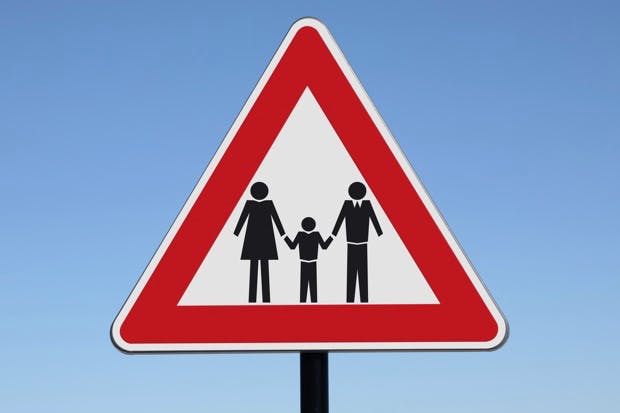Earlier this week, academics at Oxford and Cambridge were likely to be cock-a-hoop that their universities top international leagues tables taking both gold and silver spots. Britain leads the world when it comes to getting top places in international league tables of higher education. As a country, we sell TV shows across the globe and are cultural leaders pushing our soft cultural power; the Premier League is the most watched football league in the world; the City of London is the money capital of the world. Unfortunately, there are things we are less good at. In another league table published recently, Britain sits pretty much rock bottom when it comes to families breaking up. The UK leads the world in the number of families we have falling apart. A child in Britain is more likely to experience family breakdown than almost anywhere else in the world. Compared to our European neighbours, only a Latvian child is more likely to grow up in a home without both parents. When a family breaks up, it is almost always the dad who leaves the family home and, in 2017, 2.7 million children grow up in homes without a father figure.
This issue cuts across almost every bit of the prime minister’s ambition to lead a socially reforming government. In tackling our childhood mental health crisis, family issues are cited by over half of all children treated by Child and Adolescent Mental Health Services as the cause of their mental health problems. Our social care crisis isn’t simply an issue of money, it is made worse by families breaking up and scattering across the country. This year we reach a ‘tipping point’ in our demography, where the number of older people needing care will outstrip the number of working age family members currently available to meet that demand. For a government that talks frequently about boosting social mobility and building a ‘Great Meritocracy’ recent evidence from the Early Intervention Foundation points to the quality of parental relationships as the ‘primary influence’ on outcomes for young children.
Earlier this week, almost a quarter of backbench Conservative MPs put their name to a Manifesto to Strengthen Families and called on the prime minister to back the family as she plots a new social reform narrative to define her government as more than one long Brexit negotiation. In producing a comprehensive list of policy ideas to strengthen families, backbenchers in the Conservative Party have given the prime minister a much needed policy platform to help families growing up in our poorest areas.
Across eighteen different areas, the manifesto calls on the prime minister to introduce a marriage allowance within universal credit, restructure local children’s services to focus on supporting families and a new requirement on health services to recognise the role of fathers. It’s easy for political talking heads to say this isn’t the role of government or there is nothing we can do to reduce our world record rates of family breakdown. This manifesto knocks that wisdom on its head.
As it stands, Britain is a country where family breakdown falls disproportionately on poorer children. The government’s own data on family break up uncovers an alarming inequality. By the age of five, almost half of children in our poorest areas have seen their families break apart compared to only sixteen per cent of children growing up in better off areas. If the prime minister is going to readopt the language of tackling ‘injustice’ then helping poorer children grow up in a stable family environment is a good place to start. A country that works for all, not just the privileged few can’t simply let a stable family life become a middle class perk, one of the many advantages of being born on the right side of the tracks.
These MPs have shown that the Conservative Party can be the party of the family once again and this issue remains as strong as ever amongst backbenchers – from newbie MPs to old hands, left and right of the party.
In a few weeks, the prime minister will set out the government’s priorities for the coming year in her speech to Conservative Party Conference. In amongst the rhetoric a strong message on strengthening families is needed if the government wants to deliver on its ambition for social reform. Theresa May’s own backbench MPs have given her some serious policy content to consider ahead of her big party conference turn.
Frank Young is Head of Family Policy at the Centre for Social Justice






Comments